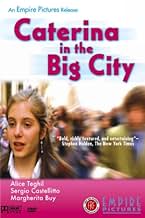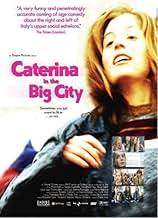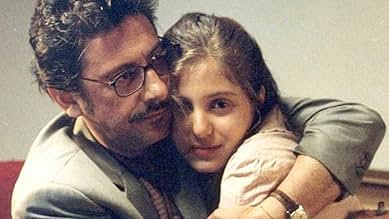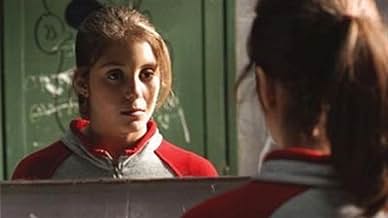IMDb RATING
6.8/10
3.3K
YOUR RATING
Caterina, forced to leave her small town at the age of thirteen, faces the complications of living in the big metropoly of Rome.Caterina, forced to leave her small town at the age of thirteen, faces the complications of living in the big metropoly of Rome.Caterina, forced to leave her small town at the age of thirteen, faces the complications of living in the big metropoly of Rome.
- Director
- Writers
- Stars
- Awards
- 7 wins & 9 nominations total
Zach Wallen
- Edward
- (as Zach -James Smith- Wallen)
Margerita Mazzola
- Martina
- (as Margherita Mazzola)
Martina Tasquetta
- Alessia
- (as Martina Taschetta)
Giulia Gorietti
- Giada
- (as Giulia Elettra Gorietti)
- Director
- Writers
- All cast & crew
- Production, box office & more at IMDbPro
Featured reviews
CATERINA IN THE BIG CITY offers a novel and original approach to The Teen Genre. A timeless 'Coming of Age' tale is portrayed with truth and style, although the specifics of contemporary Italian politics lose a bit in translation, even a viewer who is ignorant of European politics is not left in the dark. Caterina (played by Alice Teghil) is a junior high school aged student who relocates to Rome with her family. Her father is a frustrated teacher who feels that his career has been sidetracked in the sleepy, coastal town of Monalto, and looks forward to the possibility of social and intellectual advancement in the big city. Soon, he runs up against the stratified nature of Italian society, and Caterina encounters the same setup, but within her school system. From her first day in class, she meets classmates who toss around political jeremiads which they don't really comprehend, but are very emotionally attached. Although, by the end of the school year, Caterina is moved and changed by her experiences, she seems to understand that these emotionally charged names and categories never tell the whole story, and really amount to passionate clichés. Paolo Virzì, the director, is known in Italy for his ability to examine the entrenched nature of Italian politics with humor and insight. CATERINA IN THE BIG CITY an intelligent look at what it is like to live in a stratified society, and to strive to locate your unique and proper place.
One of the best movie I've seen recently. An exciting coming of age, an exhilarating comedy, a deep and painful portrait of our society at the present moment."Caterina Va in Città" has outrageously funny scenes starting with Giancarlo's biting farewell to his despised small-town students. But it's a very dark sense of humor. The film is really about personalities, especially his. Imagine a standard coming-of- age movie about a smart, unusual kid learning that it's okay to be an individual, different from the rest. Giancarlo is that kid, only he's 40-something and he hasn't had that final scene where everything turns out okay. Angry that others have gotten all the breaks in life, he righteously criticizes the establishment, big money, the old boys' network, and yet envies them at the same time. Back in Rome, he has a chance to mingle with exactly the class of people he inwardly resents, and every chance he gets to make a mark among them turns to embarrassment.
Played with great flair by Sergio Castellitto (the insouciant chef from "Mostly Martha"), Giancarlo is an enormously sympathetic but uncomfortable character, and his contradictions have a ripple effect on everyone in his orbit. His wife Agata (Margherita Buy) lives in a shell rather than get in the way of her grandiose husband. Caterina (Alice Teghil) is thrust uneasily into a social scene she's thoroughly unprepared for, made even more out of place by her dad's instructions. She doesn't seem to have inherited his low self-esteem, but this new life flies way over her head most of the time. It's a complex portrait of a family's struggle, set amid the tumult of big-city society and class consciousness. "Caterina" is a very rewarding movie.
Played with great flair by Sergio Castellitto (the insouciant chef from "Mostly Martha"), Giancarlo is an enormously sympathetic but uncomfortable character, and his contradictions have a ripple effect on everyone in his orbit. His wife Agata (Margherita Buy) lives in a shell rather than get in the way of her grandiose husband. Caterina (Alice Teghil) is thrust uneasily into a social scene she's thoroughly unprepared for, made even more out of place by her dad's instructions. She doesn't seem to have inherited his low self-esteem, but this new life flies way over her head most of the time. It's a complex portrait of a family's struggle, set amid the tumult of big-city society and class consciousness. "Caterina" is a very rewarding movie.
I think Virzì is one of the most interesting director in Italy, at the present moment. His ability to portray the current Italian society is quite good, and he achieves this either with *characters* (the two families in "Ferie d'Agosto", the father in "Caterina va in città") and with *stories* (the story of "Ovosodo", a bit of an Italian "It's a wonderful life"... just a bit, obviously... :-).
"Caterina va in città" is a good movie: the idea of showing chunks of the Italian society and habits through the eyes of an innocent teenager gives the movie a "fairy tale" twist that makes it really "light" and enjoyable. I also liked the mom's character, played by a really good and beautiful Margherita Buy: in general, I appreciated Virzì's idea that the "good" part of society is based on the strength of women, as all male characters in this movie either are donquixotesque losers or spoiled and arrogant over-grown babies.
But, as for most of his movies, I think the same criticism again apply: Virzì is openly a left-wing director, but he stresses this a bit too much and sometimes its works sound too "ideological": art should make you think, not tell you what to think, I guess. In addiction, some characters are too stereotypical and don't come out of a really deep psychological analysis. Still, I think he is currently the director who knows best how to take on the screen what goes on in Italy.
In conclusion, I think this movie - just like "Ovosodo" - is based on a simple yet powerful assumption: that happiness is the disease of the idiots...
"Caterina va in città" is a good movie: the idea of showing chunks of the Italian society and habits through the eyes of an innocent teenager gives the movie a "fairy tale" twist that makes it really "light" and enjoyable. I also liked the mom's character, played by a really good and beautiful Margherita Buy: in general, I appreciated Virzì's idea that the "good" part of society is based on the strength of women, as all male characters in this movie either are donquixotesque losers or spoiled and arrogant over-grown babies.
But, as for most of his movies, I think the same criticism again apply: Virzì is openly a left-wing director, but he stresses this a bit too much and sometimes its works sound too "ideological": art should make you think, not tell you what to think, I guess. In addiction, some characters are too stereotypical and don't come out of a really deep psychological analysis. Still, I think he is currently the director who knows best how to take on the screen what goes on in Italy.
In conclusion, I think this movie - just like "Ovosodo" - is based on a simple yet powerful assumption: that happiness is the disease of the idiots...
"Caterina va in città" seems like your typical teen film. It somehow reminds me of "Thirteen", but it goes a little deeper than the average American teen film.
In American teen films the parents are normally reduced to simple shadows that serve more as a background for their sons and daughters' lives - they are either of the preaching-repressive sort, or the tolerant, ever-forgiving parents, that eventually through love will help their children to the way of redemption.
Not so, "Caterina va in città". In this film, not just Caterina ( Alice Teghil) but her parents as well are portrayed as three-dimensional human beings and this makes the film more interesting.
Caterina and her parents move from a small Italian town to Rome. And there Caterina's life will be shaken. She goes to high school and meets new friends - many new things happen in her life. She feels uprooted from her old self, and doesn't know anymore who she really is.
One can say that "Caterina va in città" is a coming of age film - it portrays her search for her place in the world - many American teen films tell the same story. But what differentiates this film from its American counterparts is the attention it gives to the parents. The father Giancarlo (Sergio Castellito) is a deeply disturbed personality. He thinks the world revolves around him and there's a conspiracy of important segments of society whose main aim is preventing him from succeeding in life. He is an egoist that treats his wife as a dumb servant and his daughter as a beautiful puppy. But no, he's not a "bad" man - in his own distorted way he loves his wife and his daughter. Sergio Castellito gives us a stellar interpretation as the problematic father, underlining his pathetic and quixotic traits. Agata (Margherita Buy), is his ever-enduring wife - she has a deeper layer than it may appear at first glance. And there's Caterina living with them, seeing them with her innocent eyes.
The other characters in the film are what one could call walking clichés. Nothing that has not been shown before in American teen movies. Politics shows its colors in the film, but in a very superficial way. It's not really essential for the film's story - left and right could have been easily substituted for rival football teams.
The ending (difficult to imagine in American films) will come as a surprise and have a liberating effect on the viewer. All in all, "Caterina va in città" is a good teen film thats stands a bit above the usual film of the genre.
In American teen films the parents are normally reduced to simple shadows that serve more as a background for their sons and daughters' lives - they are either of the preaching-repressive sort, or the tolerant, ever-forgiving parents, that eventually through love will help their children to the way of redemption.
Not so, "Caterina va in città". In this film, not just Caterina ( Alice Teghil) but her parents as well are portrayed as three-dimensional human beings and this makes the film more interesting.
Caterina and her parents move from a small Italian town to Rome. And there Caterina's life will be shaken. She goes to high school and meets new friends - many new things happen in her life. She feels uprooted from her old self, and doesn't know anymore who she really is.
One can say that "Caterina va in città" is a coming of age film - it portrays her search for her place in the world - many American teen films tell the same story. But what differentiates this film from its American counterparts is the attention it gives to the parents. The father Giancarlo (Sergio Castellito) is a deeply disturbed personality. He thinks the world revolves around him and there's a conspiracy of important segments of society whose main aim is preventing him from succeeding in life. He is an egoist that treats his wife as a dumb servant and his daughter as a beautiful puppy. But no, he's not a "bad" man - in his own distorted way he loves his wife and his daughter. Sergio Castellito gives us a stellar interpretation as the problematic father, underlining his pathetic and quixotic traits. Agata (Margherita Buy), is his ever-enduring wife - she has a deeper layer than it may appear at first glance. And there's Caterina living with them, seeing them with her innocent eyes.
The other characters in the film are what one could call walking clichés. Nothing that has not been shown before in American teen movies. Politics shows its colors in the film, but in a very superficial way. It's not really essential for the film's story - left and right could have been easily substituted for rival football teams.
The ending (difficult to imagine in American films) will come as a surprise and have a liberating effect on the viewer. All in all, "Caterina va in città" is a good teen film thats stands a bit above the usual film of the genre.
I saw 'Caterina va in Città' in Sydney, where the audience had mixed reactions to the schoolboy who speaks Italian with what's apparently meant to be a Sydneysider accent. In general, I was impressed by the ensemble acting, but I felt that the best performance was given by Margherita Buy as the heroine's mother Agata. I was disappointed that Agata has so little to do with the main plot of the film.
The symbolism is just a trifle heavy-handed in this movie. Remember those Hollywood war movies from World War Two, in which the bomber crew conveniently had one member of every (white) ethnic group? (And there was usually one rich guy and one guy from the slums.) Well, director/co-scriptwriter Paolo Virzi has got that gimmick here, Italian style. When 15-year-old Caterina's parents move house from a Tuscan seaside town to Rome and enrol her in a big-city school, the student body conveniently includes the full spectrum of Italy's national archetypes. For example, Daniela is wealthy, beautiful and popular, the daughter of an official in the right-wing government. Margherita is a left-wing 'revolutionary', the daughter of a famous intellectual. Of course, the film implies that Margherita is somehow better and more 'authentic' than Daniela.
Because I found the political subplots of this movie to be deeply clichéd -- especially since Italy is in no position to lecture any other nation on the subject of politics -- I was pleased that the film's political content stays firmly secondary. The main story of this movie is, rightly, Caterina's uneasy and awkward progress through adolescence and into adulthood. It's no surprise to discover that being a teenage girl in modern Italy is difficult, but surely every adolescent -- male, female, rich, poor, in any century or culture -- has found adolescence to be a difficult time of transition. Except for some of its political comments, I found this to be a very honest and intelligent film, with characters I really cared about. I'll rate 'Caterina va in Città' 8 out of 10, and I look forward to more films from Paolo Virzi. Brava, Caterina!
The symbolism is just a trifle heavy-handed in this movie. Remember those Hollywood war movies from World War Two, in which the bomber crew conveniently had one member of every (white) ethnic group? (And there was usually one rich guy and one guy from the slums.) Well, director/co-scriptwriter Paolo Virzi has got that gimmick here, Italian style. When 15-year-old Caterina's parents move house from a Tuscan seaside town to Rome and enrol her in a big-city school, the student body conveniently includes the full spectrum of Italy's national archetypes. For example, Daniela is wealthy, beautiful and popular, the daughter of an official in the right-wing government. Margherita is a left-wing 'revolutionary', the daughter of a famous intellectual. Of course, the film implies that Margherita is somehow better and more 'authentic' than Daniela.
Because I found the political subplots of this movie to be deeply clichéd -- especially since Italy is in no position to lecture any other nation on the subject of politics -- I was pleased that the film's political content stays firmly secondary. The main story of this movie is, rightly, Caterina's uneasy and awkward progress through adolescence and into adulthood. It's no surprise to discover that being a teenage girl in modern Italy is difficult, but surely every adolescent -- male, female, rich, poor, in any century or culture -- has found adolescence to be a difficult time of transition. Except for some of its political comments, I found this to be a very honest and intelligent film, with characters I really cared about. I'll rate 'Caterina va in Città' 8 out of 10, and I look forward to more films from Paolo Virzi. Brava, Caterina!
Did you know
- TriviaSara Pallini's debut.
- GoofsThe story begins in 2003, but the dates do not match up with the days of the week for that year.
- ConnectionsReferences Les Blues Brothers (1980)
- SoundtracksInno ufficiale dei giovani fascisti
Music by Giuseppe Blanc and lyrics by Vittorio E. Bravetta
Sung at the wedding reception
- How long is Caterina in the Big City?Powered by Alexa
Details
- Release date
- Country of origin
- Language
- Also known as
- Caterina in the Big City
- Filming locations
- Production companies
- See more company credits at IMDbPro
Box office
- Gross US & Canada
- $296,464
- Opening weekend US & Canada
- $9,352
- Jun 5, 2005
- Gross worldwide
- $4,407,426
- Runtime1 hour 47 minutes
- Color
- Sound mix
- Aspect ratio
- 2.35 : 1
Contribute to this page
Suggest an edit or add missing content






















